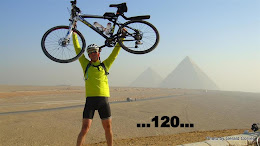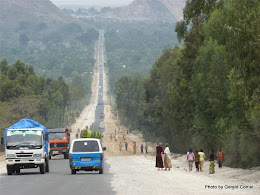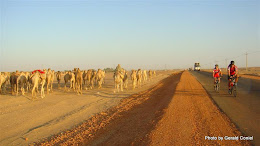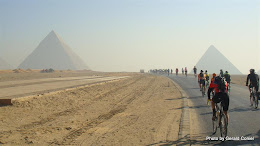Bahir Dar.... Have you ever heard of this town before? Well, what a nice little surprise. This small town situated along the shore of lake Tana has a good vibe with its palm tree bordered streets, its civilised traffic, its numerous terraces packed with well dressed locals and its cool breeze coming from the lake. Bahar Dar is also the capital of bicycles in Ethiopia, the reason is simple, it is flat! All this makes it pleasant and relaxing to wonder along Bahar Dar main streets under the shade of the palm trees and without having to look for dangerous taxi drivers trying to kill you. Even the numerous Touk Tuk drivers here are more relaxed and more friendly. I could not believe my eyes when I saw that every vehicle was stopping at the traffic light yesterday when we arrived in town. This was the first time I saw that since I left Europe 5 weeks ago.
Here also, no harassment from kids, no "you you", just a normal life.... Great relief for our minds after a week in Ethiopian countryside.
David, one of the riders found this unbelievable resort next to the lake. About 10 of us have booked ourselves into the ultimate luxury. This place is just like the South African 5 stars resorts I have experienced, but for a third of the price. It is a piece of heaven, what a change after living in our dirt filled tents for a month. If luxury ever felt good, now is really when it feels best. The 150 dollar tariff includes a magnificent room with 2 beds, one inside the room and one on your terrace hanging over lake Tana. It also includes, dinner, breakfast, a full body massage, a pedicure and a manicure. The room has a fire place, an enormous bathroom, the mini bar has a full size bottle of Johnie Walker black label.... What else do you need in life?
So, what do riders do on rest days? Well, despite resting, they update their blogs, go looking for food to stock for the coming days (nuts, chips, dry fruits and so on), they clean and oil their bicycles, they also wash everything they own. So today, I used the opportunity of having a huge bathroom with unlimited supply of hot water (something difficult to imagine in Africa!) to wash all my big items. So I washed my tent, I washed my mattress, I washed my sleeping bag, I even washed myself... I have now turned my terrace into a semi professional laundry operation... My tent was the worst, the colour of the water after the first wash made me feel that it will be half a kilo lighter once dry...
I used the morning remaining free time to visit the local market. What an interesting place. The streets are filthy, but everything that this region of Ethiopia produces is been sold there, more or less directly by the thousands of small farmers who make their way to town in early hours of the morning. The outskirt of the market is filled with trucks, donkeys and horses who carried in all the products on old broken down trailers. When I say that the streets are filthy, it is a bit of an understatement. As I was making my way through this mess, I noticed 2 children who were busy having a crap in the middle of the street. Obviously Ethiopia is not equipped with public toilet facilities, but it is always a shock when you see humans doing their thing in the middle of a busy street.
The flavours rising from the spices of the many stalls brought my attention away from the 2 kids and I started shooting photos of this amazing festivities of colours that these pigment powders are displaying. Farmers sell their freshly picked piments directly to some local small factories based on the outskirts of this gigantic market (it covers several street blocks). These small workshops dry the piments directly in the street in front of them and then process them into powder in a room filled with a stingy smell of pigment that got me to sneeze instantly as I took a few shots inside. The workers must have their lungs completely eaten by the pigment powder that floats in the air. Nobody was wearing any kind of mask or protection. I noticed that I was not alone at coughing, most of the employees also did.
We are now 5 riding days away from Addis Ababa. These are 5 straight days of pure climbing. We have some serious challenges ahead as we will be going over 3400 meter high passes. Looking at the map, I can already say that the next rest day in Addis is going to be looked forward. Addis will also be our first bike donation occasion and I will of course do a detailed reportage about that on the blog. Thanks to many of you who have contributed, I have raised money to donate 109 bikes during this tour. There will be 8 donations places in total.
At camp, 2 nights ago the TDA staff gave us a formal apology about Dinder park and confirmed that they were also taken back by the difficulty of that park crossing. Most riders appreciate this and it felt good to hear that it was not just us being tired, it was hell and somehow we went through it. On the other hand, such challenges are what make Tour D Afrique so unique. It is not a leisure tour, it is a physical and mental challenge that will take us all to our limits. In real life, we never get to push ourselves to such extreme conditions and for so many days, so it is also a great way to learn about ourselves and how we cope under very tough conditions. Lets just not make it a routine....
There are now 13 people remaining in the EFI club. Pressure to remain EFI is clearly being felt as technical questions were raised about the exact rules on when does one loses its EFI and so on. Basically, you lose it as soon as you cannot complete a stage. Paul told us that they would now enforce a stricter policy about that and would force late riders off the road as soon as it would get dark. Up to now, they have been quite accommodating and have allowed some riders to finish in the early hours of the night if they could be followed by a safety vehicle. So, no more Mr Nice Guy for the few EFI members left.... We have been warned....
Sugar cane farmer selling her cane directly at the market
Inside the piment manufacture, employees fill the bags by hand without any masks
The poultry section of the gigantic market
This is a pile of "TEF" a tiny grain used to produce the wheat for
making "Injera", a kind of thick wet pancake on which you place
several other food such as lentils and other vegetables on fasting
days. On non fasting days, some meat is added as well. It is delicious!
Even in the dirty streets of the market, Ethiopia is colourful...
The flavours are just as colourful
Young boy delivering sugar cane
This is the grain they use to produce home made beer.
The streets of Bahar Dar are pleasant and traffic is relatively calm.
Lake Tana view from the lodge restaurant
The luxury lodge in which 10 of us have booked ourselves
The piment manufacturers dry them in the busy streets outside their workshop.
Tuesday, 16 February 2010
Subscribe to:
Post Comments (Atom)

.jpg)
.jpg)
.jpg)
.jpg)
.jpg)
.jpg)
.jpg)
.jpg)
.jpg)
.jpg)
.jpg)
.jpg)

.jpg)
.jpg)
.jpg)
.jpg)

.jpg)
.jpg)
.jpg)
.jpg)
.jpg)

.jpg)




.jpg)

.jpg)


.jpg)

2 comments:
The quiet before the storm. Enjoy the serenity.
Jacky et Josette Girod , de l'Alsace, amis de Gérard et de Denise , nous venons de lire ton blog ....Chapeau !!!comme on dit en france ...
Tous nos voeux pour la suite en te souhaitant de te maintenir dans l' EFI
ON continuera de te suivre via ton blog
Post a Comment